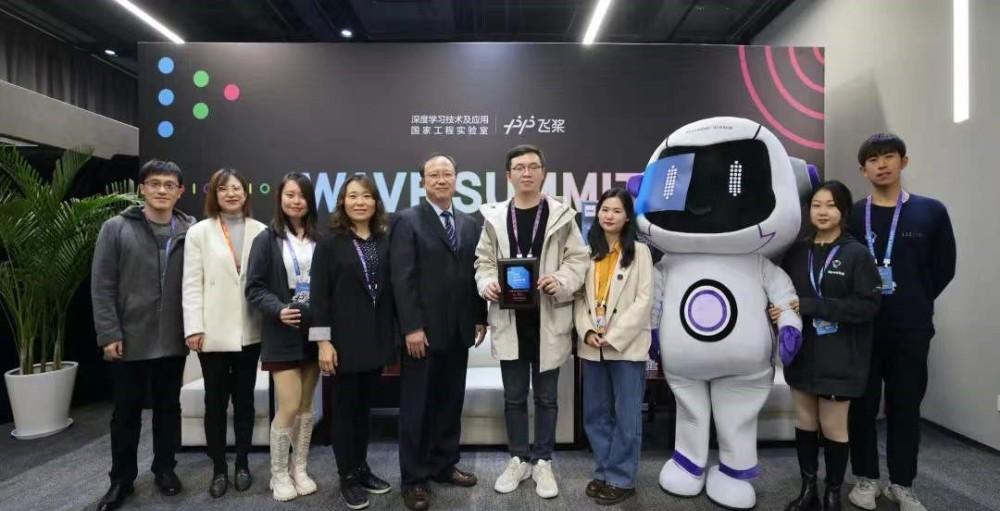Author: Wang Xin Source: IT Times

The scene of the award ceremony of the "Flying Paddle Hackathon" competition
Recently, at the WAVE SUMMIT+2021 Deep Learning Developer Summit hosted by the National Engineering Laboratory for Deep Learning Technology and Applications, Intel announced the cooperation between its OpenVINO and PaddlePaddle (Baidu "Flying Propeller") in open source deep learning, and published its views on the cultivation of AI programming talents.
OpenVINO and PaddlePaddle blend seamlessly
"There is an old Chinese saying that 'wine is not afraid of deep alleys', but now this sentence is no longer true." Wang Yan, product marketing director of edge intelligent development tools in China of Intel's Internet of Things Division, said that around the cooperation between OpenVINO and PaddlePaddle, Intel has carried out a series of developer ecological construction and ecological activities, hoping that more developers will understand Intel's technology and cooperate and build together.
Intel AI software "evangelist" Wu Zhuo introduced, OpenVINO is an open source toolkit of Intel company, which can be a good model optimization for the deep learning model trained by some deep learning frameworks, including PaddlePaddle, including engine inference and acceleration, so as to facilitate developers to deploy to more diverse hardware platforms, easy to use in familiar scenarios.
The data shows that as Baidu's open source deep learning framework, PaddlePaddle has open sourced more than 400 industrial-grade pre-trained models. Developers can use both the more than 300 pre-trained models in the OpenVINO Open Model Zoo and the 400 models from PaddlePaddle.
"OpenVINO already has direct support for many of Paddle's operators." Wu Zhuo said that developers no longer need to convert the model of the intermediate format, but directly use the IE expansion inference engine to read paddlePaddle's model.
At the Developer Summit, Intel demonstrated an AI-box, an industrial control box in a factory environment with pre-installed Intel i5 CPUs and openVINO and PaddlePaddle deployed. In the field display, AI-box can use paddle OCR application for text extraction recognition, OpenVINO can be read directly without any intermediate steps of conversion steps, and the actual application efficiency is also very high, can support 30 frames per second video real-time OCR text extraction.
Wu Zhuo said that in the cooperation process of OpenVINO and PaddlePaddle, it still strives to give developers a concise and convenient experience, through the construction, optimization, deployment of three very simple steps, you can use OpenVINO to read the model of PaddlePaddle, and then accelerate the process of inference.
The threshold for AI development and application is getting lower and lower
"Artificial intelligence presents the characteristics of 'fusion innovation' and 'lowering the threshold'." Wang Haifeng, chief technology officer of Baidu and director of the National Engineering Laboratory for Deep Learning Technology and Application, believes that on the one hand, there are more and more integration and innovation of AI technology and industry; on the other hand, although AI technology is becoming more and more complex, the threshold for AI development and application is getting lower and lower.
Li Sangyu, a 25-year-old railway worker in the Xiangyang railway section, developed a set of "automatic detection system for the body character and logo of railway freight cars" by teaching himself paddle Paddle development kits, realizing the automatic recognition of railway freight car numbers. The whole project, he alone. The work that used to require manual verification for several hours now takes only 3 minutes to complete, saving more than 200,000 yuan in costs for the Xiangyang depot.
Yu Jun, a third-year computer research student at East China University of Science and Technology, is the winner of the Flying Paddle Hackathon Competition jointly organized by Baidu and Intel, Yu Jun said that he is familiar with Python and C++, learned C++ when he was an undergraduate, and began to use Python after graduate school.
"More and more voices are calling for the cultivation of AI talents to start from dolls." Wang Said, Intel has integrated related technologies and set up AI courses at different levels, including K12 courses for college students, graduate students, and middle school students.
"For college students and graduate students, we can explain the theoretical basis of AI technology in more depth and how to build models, for primary and secondary school students, Intel is based on entertainment, so that they can understand more and broaden their horizons." Wang Yan introduced that in some openVINO-related tutorials, there are already a lot of Jumpyter Notebook-based Demos, which can also be handed over to middle school students to run, take a look, and experience the implementation of AI technology.
Dr. Zhang Yu, senior chief engineer of Intel, global chief technology officer of the Internet of Things Video Division, and chief technology officer of the Internet of Things Division in China, said that Comrade Deng Xiaoping put forward the slogan of "computer starting from dolls" in Shanghai, saying that this sentence is still applicable today, including artificial intelligence AI can also be said to start from dolls.
"We hope to be able to let children learn about AI earlier." Zhang Yu introduced that last year, Intel cooperated with the Central Institute of Electronic Education to launch many ARTIFICIAL-based solutions that stopped classes during the epidemic. At the same time, Intel has cooperated with many colleges and universities in China to launch openVINO-based high-quality courses; cooperated with Baidu to conduct live teaching on the B station, telling programming enthusiasts and developers how to use Baidu PaddlePaddle and Intel's OpenVINO to accelerate the construction and inference implementation of artificial intelligence algorithm models.